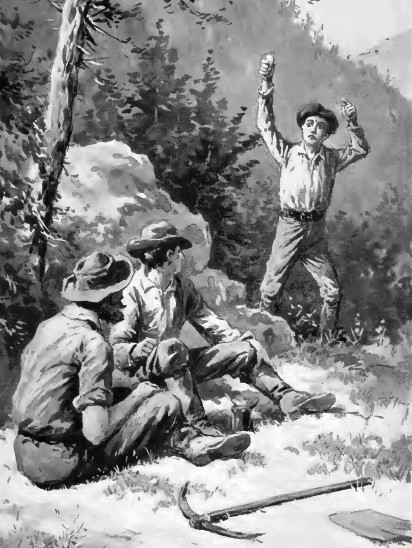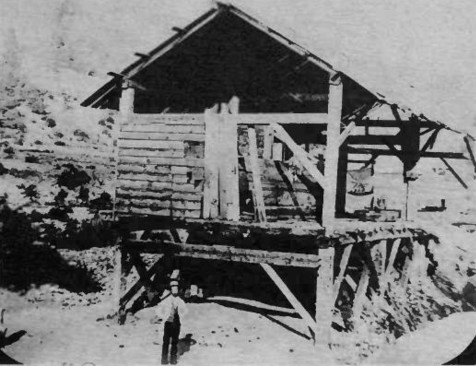In the summers of '53-'54, those who still continued in the occupation of gold mining, turned their attention chiefly to river and hill mining, returning to the rivers in the dry season and to their hill claims in the fall, after the rivers had risen, and rendered such mining impracticable. Tunnels were run into the old river channels in all directions; with varying success, however, some being a perfect failure, whilst from others fortunes were realized. Among the richest of these were the forest hill claims, where was found the celebrated blue gravel lead, this being discovered principally amid the ancient river beds, in the central and northern mining regions of the State, but small sections of it ever having been found through the southern portions. These hill claims were very extensive, and many throughout the mining regions, upon which work was commenced nearly thirty-eight years ago, are yet being worked with success. The same manner of working as originally, by drifting, is still in vogue, although the gravel, instead of being washed as it was at that time, is now crushed in mills in the same manner as quartz, and with greater profit. Many of these old abandoned hill claims, from which the gravel had been previously drifted, were afterwards washed away by the hydraulic process, with good success.
This process of mining commenced, I think, in some of the mines in the spring of '52, and such was found to be the great advantage of the method, and the facility with which whole hills could be removed from their foundations and carefully and evenly deposited among the farms in the low counties, leaving, of course, the gold behind, that it came into general use throughout the mining regions wherever sufficient fall and water could be obtained. Old abandoned mines were by this process made very remunerative, as was the case also with many ravines and flats which could be washed to advantage, without regard to the rights of those who had fenced in and improved their garden spots with fruit trees, vines and flower-beds.
It was the general opinion of the great majority of the mining classes, from about the year '51, that California was exclusively a gold mining country; that it was fit for nothing else, and that no man had a right to question this opinion, or to build upon, or to fence in, any portion of the soil for any other purpose whatsoever for his own individual use, that a miner was bound to respect. This idea yet exists in the minds of many, or at least of that portion who are engaged in hydraulic mining, for in their opinion the business of mining, being the first and original industry of the country, must have precedence over all other kinds of business, and of course this priority gives them the right to fill up, cover up, and destroy the property of the farmers below who were foolish enough to get in the way.
It was some time during the early spring of '52, that mining men and geologists turned their attention to the various quartz ledges which were found projecting above the surface of the ground among the hills, many of which, upon examination, proved to be very rich in gold. The opinion soon became general, and a well demonstrated fact, that all gold found among the ravines, flats, hills and river beds, came originally from these same quartz ledges, and that locked within the solid quartz, in the finest of particles, was its original condition. In consequence of volcanic eruptions and glacial action the hills and ledges had, in course of ages, been broken up and worn away to their present elevation, the gold there from having been scattered by the force of the rushing waters among the ravines and river beds, where it is now found.
In '53 the erection of quartz mills commenced, and soon the crash and rattle of their stamps could be heard echoing among the hills and canyons. In the first excitement of quartz mining, mills were erected upon all ledges which showed the least appearance of containing gold, but it was soon discovered that the greater portion of them did not pay expenses. The consequence was, it is safe to say, that hundreds of mills were idle in a year hence, and the valuable machinery was left to rust and decay. In the case, however, of many of these old abandoned ledges, further prospecting at lower depth proved them to be of value, and many of them at the present time are being worked with profit, owing to the improved methods of saving the gold. It has been said that gold mining was not a legitimate business, and that the intense desire for gold created unnatural conditions. But observation and experience show us that the happiness of the human family, as well as the grade of civilization to which it is possible to attain, depends upon the quantity of gold which it is possible to acquire, and its proper use. Without gold in what would life consist? What would be its chief aim and consideration? Why, there wouldn't be any aim at all, for there wouldn't be any target worth the aiming at. It was the desire to possess this precious metal that prompted thousands of us to undertake such a long wearisome, and dangerous journey around those gigantic obstructions at the extreme end of the continent, as well as a tedious journey across the barren deserts. It is this desire, also, or incentive, which builds our great cities, our great manufacturing industries, as well as our railroads and steamships; proving conclusively, in my opinion, that the individual who first invented and threw to the breeze the old saying that money makes the mare go understood the whole business.
But why should gold in such vast quantities be scattered here upon the western portion of our continent, and why was Nature so partial in the distribution of her favors? Was it accidental, the effect of chance conditions, or was it designed for some special purpose? The latter is the more reasonable, and therefore the more probable, theory, for observation shows us that Nature frowns upon unbalanced conditions, and that here, upon the western slope of the continent, lying silent and deserted, was an earthly paradise, unthought of, and as yet unknown except by a few, while at the East vast numbers were settling and making their homes amid the snow banks and blizzards of an Arctic climate, totally unconscious of what the conditions were at the far West, beneath the setting sun. Under such conditions it is very easy to understand why Nature frowns. It is very true, as we had been previously informed, and rightly too, that Westward the Star of Empire takes its way; yet, by the natural process of settlement it would have required hundreds of years, perhaps, to colonize and to settle up this portion of or continent, and properly balance the conditions of increased population. It was for this purpose, no doubt, that the knowledge of the existence of gold upon the western portion of our continent was reserved for the Americans, who understood its real value and knew how to use it as an incentive for the proper adjustment of unbalanced conditions; and we have come as the pioneers of an advancing civilization, intending to grow up with the country and to use our best endeavors (by all legitimate means) to restore the equilibrium by an increase in population.
The hills, rivers and ravines still continued to give forth their valuable treasure ; but one fact was very evident, and that was that but a very small proportion of it remained in the mining regions. There was a continuous current of gold flowing into the chief city by the sea, and but a very small portion of it returning to the miners, who by their labor extracted it from the earth. Business men, also, among the various mining camps in the gold regions, who had succeeded in accumulating a reasonable amount, followed in the wake of this current to the big city, there to use and spend their earnings, and none, or at least but a very few, seemed willing to continue to live in and improve that portion of the country where they had won success.
The continuous flow of gold concentrated, therefore, in the hands of comparatively few men, and San Francisco became the head-center for all comers who desired to secure a portion of the golden stream. And now the city which, but a few years previous, was a mere cluster of sand-hills, began to assume the form and appearance of a great city, or the foundation upon which a metropolis was to be built. Throughout the dry or placer mining regions, numerous towns and villages had grown up which in a few years assumed conditions of considerable importance under the impression that such mining would be of a more lasting and permanent character. It required but a few years, however, to demonstrate the fact that such mining was of a transient nature; the gold in the ravines, gulches, flats and benches, as well as in the small and shallow creeks, was soon extracted, what was left by the American miner in his hasty and careless method of working being subsequently thoroughly cleaned out by the Chinese miners. These sections being later almost entirely deserted by the miners, the business men and families in the towns and villages were forced to abandon them, their homes and property soon falling into decay.
In the course of some eight years from the first discovery of gold in California, the entire country, extending from Arizona and New Mexico on the south, up through the British possessions to the Alaska line on the north, and as far as the Black Hills at the east, were traveled over and prospected by various companies of miners who were in search of another Eldorado. Although many rich localities were discovered from which a great amount of gold was extracted, yet the mines were spotted, the gold generally at a great depth and confined to a few gulches or ravines only, demonstrating the fact that no other portion of the earth's surface, at least upon our own continent, will ever be discovered where the gold is distributed so uniformly over the surface among the numerous ravines, rivers and gulches, and in such immense quantities, as was found to be the case in California. In fact, I doubt the existence of a similar deposit and of such an extent, anywhere upon the earth's surface. Neither has there been so far discovered anywhere upon the Pacific Coast mining districts that contain within their limits such a vast number of quartz ledges bearing free gold in paying quantities, as can be found in the mining regions of California at the present time.
I have stated that the majority of the residents of California, at least in the mining regions, in time became well satisfied with their adopted home, and intended to remain; but there were a few, nevertheless, who still pined for their Eastern home, for various reasons.


